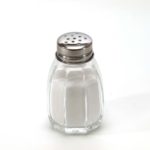
Please pass the salt.
In fact, you may want to take more than just a grain and go ahead and salt your food to taste. Doing so, most people consume about 8 to 10gms of salt per day (3000 to 4000mgs of sodium). Current dietary advice is to limit salt to 3-5gms a day (2,300 mgs sodium or less), which is about 1 tsp. Salt has been demonized as a primary cause of the increase in high blood pressure (HBP) and heart disease seen since the 1920s, even though our use of salt has steadily declined over this time.
This drop in salt use resulted when home refrigerators, introduced in the decade after WWI, replaced our use of salt to preserve food. Another cause was research from Frederick Allen, M.D. who bought the salt/blood pressure idea to the US, and Walter Kempner, M.D. who pushed this idea in the late 1930s. Unfortunately, these studies suffered from a common problem in research called “confirmation-bias”, in which data that support the theory is kept and data that doesn’t is dumped. Kempner strangely omitted the finding that low-salt diets increased heart rate, which is known driver of cardiovascular damage.
The early guidelines for salt intake were also made in part from estimates of what a hunter-gatherer would get from the meat he had daily, neglecting the high levels of salt in the blood, bone marrow, skin, organs and insects he would also eat. A 1991 review of 170 studies on salt restriction found that low sodium diets dropped blood pressure only slightly while raising levels of kidney hormones, stress hormones, cholesterol, insulin and unhealthy triglycerides. In some patients reducing salt actually increased their blood pressure.
What is now known to be a main dietary cause of high blood pressure, heart disease and even cancer is a high sugar diet. Journalists recently revealed that in the mid-1960s, three Harvard scientists were paid $50,000 each (in today’s dollars) to dismiss sugars role in heart disease, which helped prop up the now debunked idea that saturated fat was really the cause of all our ills.
The end result of this “science-for-money” insanity is decades of high sugar consumption hidden in processed food. This added sugar improves flavor and mouth-feel, and acts as a (salt-free!) preservative. Included in these foods are man-altered vegetable oils, which have also been promoted with similar shady science, and are now known to be another cause of inflammation and heart disease.
The good news is, as we reduce sugar intake our cravings for sweets lessens. Salt brings out the natural sweetness in food, improves the flavor and enjoyment of all we eat, including vegetables!
